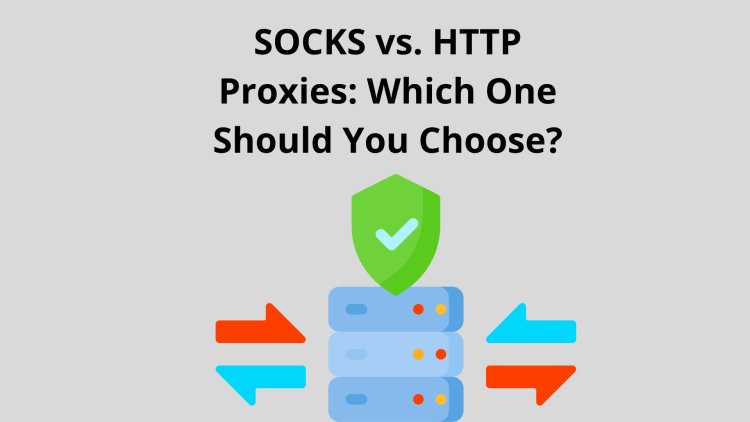SOCKS vs. HTTP Proxies: Which One Should You Choose?
Compare SOCKS and HTTP proxies to understand their differences, benefits, and use cases. Learn which proxy type is best for privacy, security, and online performance based on your needs.">

SOCKS vs. HTTP Proxies: Which One Should You Choose?
When navigating online privacy, security, or data scraping, proxies play a crucial role. Among the various types of proxies, SOCKS and HTTP proxies are among the most commonly used. Each offers distinct features and advantages depending on the task. But how do you know which one to choose for your specific needs? This article will explore the key differences between SOCKS and HTTP proxies, their benefits, and help you decide which is best for your online activity.
What Are SOCKS Proxies?
SOCKS (Socket Secure) proxies are a versatile proxy type that can handle multiple types of internet traffic, including HTTP, HTTPS, FTP, and more. SOCKS proxies work at a lower level of the internet protocol stack, making them more flexible in handling different types of online traffic.
Key Features of SOCKS Proxies:
- Protocol Support: SOCKS proxies can handle a wide variety of internet protocols such as HTTP, HTTPS, FTP, and even P2P traffic like torrents.
- Anonymity: SOCKS proxies provide higher levels of anonymity because they don’t modify the traffic between the client and the server.
- No Content Manipulation: SOCKS proxies simply relay data without inspecting or altering it, ensuring greater privacy.
Benefits of SOCKS Proxies:
- Flexibility: Works with a wide range of applications and protocols.
- Better Privacy: Doesn’t change or filter data, maintaining your anonymity.
- Bypasses Filters: Effective for bypassing geographical restrictions and network filtering.
Common Use Cases for SOCKS Proxies:
- Torrents & P2P File Sharing: Ideal for anonymous torrenting and peer-to-peer file sharing.
- Web Scraping: Especially useful for web scraping as they bypass IP bans by rotating IPs without restrictions.
- Accessing Geo-restricted Content: Helps with accessing content and services from different countries.
What Are HTTP Proxies?
HTTP (Hypertext Transfer Protocol) proxies are designed to handle only HTTP and HTTPS traffic. These proxies work at a higher layer of the protocol stack, specifically handling web browsing requests. HTTP proxies act as intermediaries between a client and the web server, processing HTTP requests and responses.
Key Features of HTTP Proxies:
- Protocol Support: Limited to handling HTTP and HTTPS traffic.
- Content Filtering: HTTP proxies can filter and modify the traffic, blocking ads, tracking scripts, or malicious sites.
- Simplified Use: Easy to configure and integrate, especially for web browsing.
Benefits of HTTP Proxies:
- Faster Web Browsing: Optimized for HTTP traffic, making them faster for general web browsing.
- Content Control: Allows content filtering, such as ad-blocking and access control.
- Easy Setup: Simple configuration, making it convenient for basic browsing tasks.
Common Use Cases for HTTP Proxies:
- Anonymous Browsing: Used for anonymous web browsing or bypassing regional restrictions.
- Ad Blocking: Blocks ads and prevents unwanted tracking.
- Accessing Geo-blocked Content: Used for streaming or browsing content restricted to certain countries.
Key Differences Between SOCKS and HTTP Proxies
| Feature | SOCKS Proxies | HTTP Proxies |
|---|---|---|
| Protocol Support | Supports a variety of protocols (HTTP, HTTPS, FTP, P2P). | Only supports HTTP and HTTPS traffic. |
| Privacy | Higher privacy; does not modify data. | May modify data, lowering privacy. |
| Performance | Can be slower due to handling diverse traffic. | Generally faster for web browsing. |
| Content Filtering | Does not filter or modify content. | Can filter content (e.g., block ads). |
| Best For | Web scraping, torrents, and anonymity. | Browsing, ad-blocking, geo-restricted content. |
Which Proxy Should You Choose?
-
Choose SOCKS Proxies if:
- You need to handle various types of internet traffic like FTP, HTTP, HTTPS, or P2P.
- You prioritize anonymity and do not want your traffic to be modified.
- You’re performing large-scale web scraping or bypassing region restrictions.
-
Choose HTTP Proxies if:
- You are only browsing the web or accessing HTTP/HTTPS sites.
- You want a faster and simpler proxy for general web browsing.
- You need content filtering, such as blocking ads or restricting access to specific sites.
Conclusion
Both SOCKS and HTTP proxies offer distinct advantages depending on your goals. SOCKS proxies provide greater flexibility, support for multiple protocols, and enhanced privacy, making them ideal for tasks like web scraping, torrenting, and anonymous browsing. On the other hand, HTTP proxies are simpler, faster for browsing, and are great for tasks like ad-blocking or accessing geo-restricted content.
By understanding your specific requirements—whether it’s anonymity, protocol support, or speed—you can make an informed decision and choose the proxy type that best fits your needs.
What's Your Reaction?


















